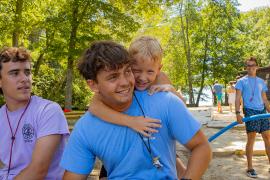With five generations actively involved in camp, it seems like the communication gap is widening. According to family physician Deborah Gilboa, MD, "The range of what is considered normal is wider now. That's going to mean some people fall behind and feel less comfortable." While having so many generations together can present some significant communication challenges within camp — as well as in communicating out from the camp community — Gilboa says it also represents a far richer experience for campers (and staff). "Each generation brings something different to the table, so kids are by definition going to have a deeper experience."
"We are struggling as a society. A lot of that struggle is around how we interact with one another and what each generation feels is appropriate, respectful, and responsible communication," Gilboa says. "In the work of camp — helping youth be more resilient and raising expectations — it is important that we are successful in navigating speaking to one another in ways that work."
Potential Obstacles to Effective Intergenerational Communication
Generational differences can cause a sense of discord if steps aren't taken to promote understanding and mutual respect:
Technology: The great debate now is whether the use of technology is "integral or adjunct," Gilboa says. "Younger generations may look at technology as a limb and completely necessary. Older generations may see technology as merely disruptive."
Vernacular: Language around what constitutes a good work ethic or who is a good employer can have a deep impact at camp. "We make those judgments based on how we communicate with [potential camp staff] and how they communicate back with us," says Gilboa.
Family of origin: Some forms of communication may push emotional buttons based on family-life experiences. For example, communication that reminds a camper of their interaction with an aunt who frustrates them may elicit a strong, potentially negative, reaction.
One of the biggest obstacles is undoubtedly our own assumptions, says Gilboa. "We make a lot of assumptions about other people based on our age. It's one of the last places where we don't get chastised for having biases and stereotypes. But, as we know, having those biases and stereotypes is not good for communication."
Strategies for Improving Intergenerational Communication
The context in which each generation grew up and the key occurrences that happened within that generation do impact how they view communication and work. A deeper understanding of that generational context can alleviate misunderstandings and open the lines of communication for learning, mutual respect, and profound connection.
With that in mind, some simple strategies can go a long way toward closing generational gaps in communication at camp (and beyond).
Gilboa says, "Question your own assumptions. Be curious enough to ask what's happening to that person instead of deciding you already know."
Camp leadership training is key. Leaders need to be able to ask really good questions about the preferred method of communication and preferred styles. "There are people who are tech savvy, tech averse, and then those in the middle. You should be asking, ‘What's your preferred method of contact? How would you like to be addressed?' This includes asking campers their preferred name and asking how donors prefer to be approached.
"The advantage to asking questions is not to check off the boxes, it's to open the dialog about communicating. You're much more likely to get honest feedback that improves communication that way.
The truth is, "we like to be in relationships with people who are curious about us," says Gilboa.
Benefits of Exposure to Different Generations
We recognize the importance of diversity at camp, but "we tend not to think about the diversity of age and life experience," Gilboa says. Older generations represent a significant modeling opportunity for campers.
"Many kids are hesitant to talk to people of older generations," she explains. "At camp, they get to model and practice how to speak respectfully and comfortably with people who are older (or younger than them, for that matter).
"There's research to show that kids who have relationships with individuals who are two generations older than themselves are safer from risky behaviors," she adds. If camp can facilitate those relationships, all the better.
We can begin to break down biases through our face-to-face interactions at camp, so when it comes to involving older generations in camp activities, Gilboa suggests actively reaching out to area senior citizens to ask them to mentor campers and/or camp staff, participate in camp programs, or even just come in for a Q&A session about a job they love or an experience they had.
She says, in addition to asking senior citizens to come volunteer at camp, consider taking your campers into the community to volunteer alongside senior citizens in their environment.
A lasting, positive impact on campers may also come from healthy interactions with individuals who are just one or two generations apart. Gilboa says, "If we're intentional about teaching our staff members how to be effective communicators, campers are exposed to near peer relationships. Kids accept value lessons best from near peer educators. So if character development is part of your camp program, then arming your staff with improved communication skills will help them grow better campers through applicable teaching and meaningful interactions."
Every relationship at camp is a character growth opportunity. "Each relationship at camp has value in making campers the people their parents sent them to camp to become.
"Intergenerational communication is something that we all do every day," Gilboa adds. "The better we get at it the more successful our camp mission will be."
Reference
- The Center for Generational Kinetics. (2018). Generational breakdown: Info about all the generations. Retrieved from genhq.com/faq-info-about-generations/
Marcia Ellett is a professional writer and editor. She is currently the assistant editor of ACA's Camping Magazine.


